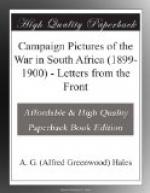It is not, in my estimation, the whole duty of a war correspondent to go around the earth making friends for himself, or looking after his personal comfort, or booming himself for a seat in Parliament on a cheap patriotic ticket. It is rather his duty to give praise where praise is due, censure where censure has been earned, regardless of consequences to himself. Such was the motto of England’s two greatest correspondents—Forbes and Steevens—both of whom have passed into the shadowland, and I would to God that either of them were here to-day, for England knew them well, and they would have roused your indignation as I, an unknown man, dare not hope to do. But though what I have written does not bear the magical name of Steevens or of Forbes, it bears the hallmark of the eternal truth. Our men on the fields of war are famishing whilst millions worth of food lies rotting on our wharves and in our cities, food that ought with ordinary management to be within easy reach of our fighting generals. Britain asks of Rundle the fulfilment of a task that would tax the energies and abilities of the first general in Europe; and with a stout heart he faces the work in front of him, faces it with men whose knees knock under them when they march, with hands that shake when they shoulder their rifles—shake, but not with fear; tremble, but not from wounds, but from weakness, from poverty of blood and muscle, brought about by continual hunger. Are those men fit to storm a kopje? Are they fit to tramp the whole night through to make a forced march to turn a position, and then fight as their fathers fought next day?
I tell you no. And yours be the shame if the Empire’s flag be lowered—not theirs, but yours; for you—what do you do? You stand in your music-halls and shout the chorus of songs full of pride for your soldier, full of praise for his patience, his pluck, and his devotion to duty; and you let him go hungry, so hungry that I have often seen him quarrel with a nigger for a handful of raw mealies on the march. It is so cheap to sing, especially when your bellies are full of good eating;




